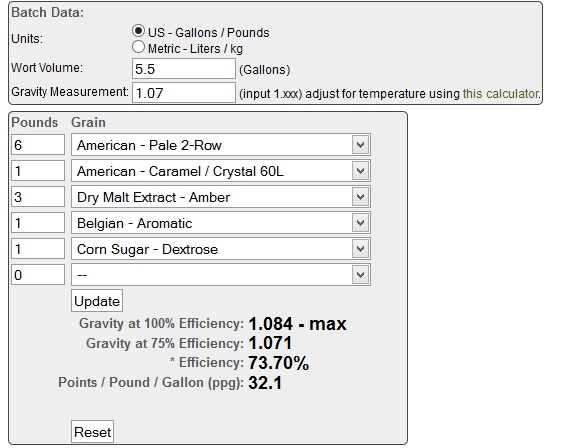OMG. His recipe calls for mashing 8 pounds of grain. If you can't fit in an extra pound of 2-Row in a 5 gallon pot, at a whole $1.30, that would more than make up for what you'd get in a sparge, you have a problem. Plus this is partial mash, not all grain. The most important fermentables are the DME in the boil pot. The grain is just for taste. So efficiency is a moot point. Now when and if he goes to all grain, yes, you'll want to get as much potential out of the larger volume of grain. So what you're saying then makes some sense, but has been mostly replaced by HERMS and RIMS practices, which again for most people, eliminate the need for a sparge. I do BIAB with a recirculating mash. I never have had to do a sparge to hit gravity/volume.
Really what should be being advocated, is having the OP mash in a cooler (a cheap investment), where he could do a full mash. He'd still have to do a higher gravity mash though, because he can only boil 3.5 to 4 gallons of wort (same 5 gallon pot). Which means he'd still have to add water to the fermenter anyways to get 5 gallons of pre-fermenter volume. So what do you want him to do, thin down the gravity of his boil wort, only to have to water it down again to get to fermenter volume? At some point he is going to have to make up the gravity short-fall, either up-front in the mash, or during boil with DME or corn sugar.
Really what should be being advocated, is having the OP mash in a cooler (a cheap investment), where he could do a full mash. He'd still have to do a higher gravity mash though, because he can only boil 3.5 to 4 gallons of wort (same 5 gallon pot). Which means he'd still have to add water to the fermenter anyways to get 5 gallons of pre-fermenter volume. So what do you want him to do, thin down the gravity of his boil wort, only to have to water it down again to get to fermenter volume? At some point he is going to have to make up the gravity short-fall, either up-front in the mash, or during boil with DME or corn sugar.

























































